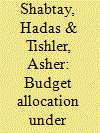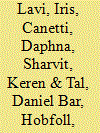| Srl | Item |
| 1 |
ID:
131327


|
|
|
|
|
| Publication |
2014.
|
| Summary/Abstract |
This study presents a framework and models for the analysis of government budget allocation into defense and civilian expenditures in situations of uncertainty about the incidence of war. The models display the intricate relationships between security levels, subjective probabilities of the occurrence of war, and potential war damages. We show that poor countries tend to perceive greater probabilities of war than their richer rivals, and that the psychological burden of insecurity is larger when the country's wealth is larger and when its preference for security is higher. We apply our models to the Israeli-Syrian arms race and show that the higher rate of growth of Israel's gross domestic product relative to that of Syria is expected to lead to an increase in Syria's perception of the likelihood of war and to a decrease in Israel's perception of such a likelihood. We also show that if Syria's regime becomes ideologically more extreme, the monetary cost of maintaining Israel's security at the level that it enjoyed prior to the change will be very high, whereas the monetary cost of maintaining Israel's welfare will be moderate.
|
|
|
|
|
|
|
|
|
|
|
|
|
|
|
|
| 2 |
ID:
128964


|
|
|
|
|
| Publication |
2014.
|
| Summary/Abstract |
Can endorsement of the ethos of conflict alter psychological effects of exposure to political violence? Israelis and Palestinians have been in a state of political and military turmoil for decades. We interviewed 781 Israelis and 1,196 Palestinians living in the West Bank, Gaza Strip, and East Jerusalem. Using structural equation modeling, we found that among those with a weak adherence to ethos of conflict, exposure predicted higher levels of hatred. For Israelis with a weak adherence to ethos of conflict, exposure predicted higher psychological distress and fear. For Palestinians with weaker adherence to ethos of conflict, stronger exposure predicted stronger threat perceptions. Israelis and Palestinians with a strong adherence to the ethos showed steady and high levels of negative emotions and threat, regardless of exposure. These results indicate that ethos of conflict is a double-edged sword that both protects and protracts the conflict. Although it serves as an engine fueling the conflict, it also plays a meaningful role as an empowering force for people suffering the psychological burden of an ongoing conflict.
|
|
|
|
|
|
|
|
|
|
|
|
|
|
|
|